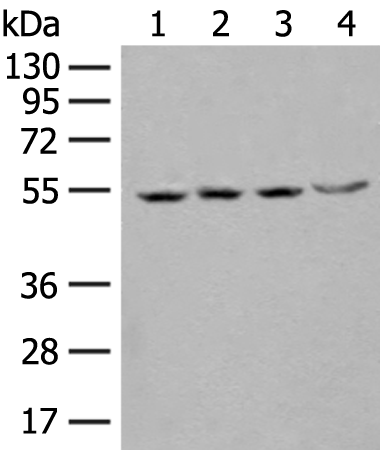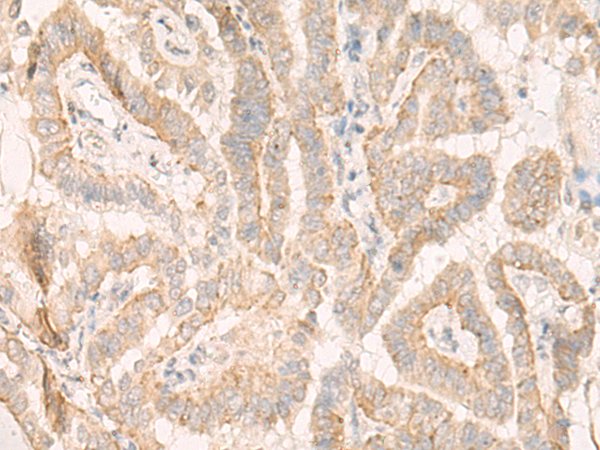

| WB | 咨询技术 | Human,Mouse,Rat |
| IF | 咨询技术 | Human,Mouse,Rat |
| IHC | 1/30-1/150 | Human,Mouse,Rat |
| ICC | 技术咨询 | Human,Mouse,Rat |
| FCM | 咨询技术 | Human,Mouse,Rat |
| Elisa | 1/5000-1/10000 | Human,Mouse,Rat |
| Aliases | GLYA; SHMT; HEL-S-51e |
| WB Predicted band size | 56 kDa |
| Host/Isotype | Rabbit IgG |
| Antibody Type | Primary antibody |
| Storage | Store at 4°C short term. Aliquot and store at -20°C long term. Avoid freeze/thaw cycles. |
| Species Reactivity | Human |
| Immunogen | Fusion protein of human SHMT2 |
| Formulation | Purified antibody in PBS with 0.05% sodium azide and 50% glycerol. |
+ +
以下是关于SHMT2抗体的3篇参考文献的简要概括:
---
1. **文献名称**:*"Mitochondrial SHMT2 regulates serine catabolism and drives acquired chemoresistance in breast cancer"*
**作者**:Kim D et al.
**摘要**:研究利用SHMT2抗体(Western blot和免疫组化)发现,SHMT2在乳腺癌化疗耐药细胞中高表达,通过调控丝氨酸代谢促进肿瘤存活,提示其作为耐药标志物的潜力。
2. **文献名称**:*"SHMT2 overexpression predicts poor prognosis in colorectal cancer and is associated with tumor immune evasion"*
**作者**:He X et al.
**摘要**:通过免疫组化(SHMT2抗体)分析结直肠癌组织,发现SHMT2过表达与患者生存率低相关,其通过调节一碳代谢抑制抗肿瘤免疫反应。
3. **文献名称**:*"Targeting mitochondrial SHMT2 for cancer therapy: insights from small molecule inhibition and antibody-based detection"*
**作者**:Morscher RJ et al.
**摘要**:研究开发了特异性SHMT2抗体用于检测线粒体蛋白表达,并验证SHMT2抑制剂在肝癌模型中的治疗效果,表明靶向SHMT2可抑制肿瘤生长。
---
以上文献均发表于《Cell Metabolism》《Cancer Research》等期刊,聚焦SHMT2抗体在疾病机制与治疗中的应用。
**Background of SHMT2 Antibody**
Serine hydroxymethyltransferase 2 (SHMT2) is a mitochondrial enzyme that catalyzes the reversible conversion of serine to glycine while generating one-carbon units critical for nucleotide synthesis, redox balance, and methylation reactions. It plays a pivotal role in cellular one-carbon metabolism, particularly under stress conditions such as hypoxia or nutrient deprivation. SHMT2 is overexpressed in various cancers, where its activity supports rapid proliferation and adaptation to metabolic challenges, making it a potential therapeutic target.
SHMT2 antibodies are essential tools for studying the expression, localization, and function of this enzyme in biological systems. These antibodies enable researchers to detect SHMT2 protein levels via techniques like Western blotting, immunohistochemistry (IHC), and immunofluorescence (IF). They are also used to investigate SHMT2's role in diseases, including cancer, neurodegenerative disorders, and mitochondrial dysfunction.
The development and validation of SHMT2 antibodies involve specificity testing against recombinant proteins or knockout cell lines to ensure minimal cross-reactivity with its cytosolic isoform, SHMT1. High-quality antibodies contribute to elucidating SHMT2’s regulatory mechanisms, post-translational modifications, and interactions within metabolic pathways. Recent studies also explore SHMT2 inhibition as a strategy to impair cancer cell survival, highlighting the antibody's utility in both basic research and drug discovery.
×